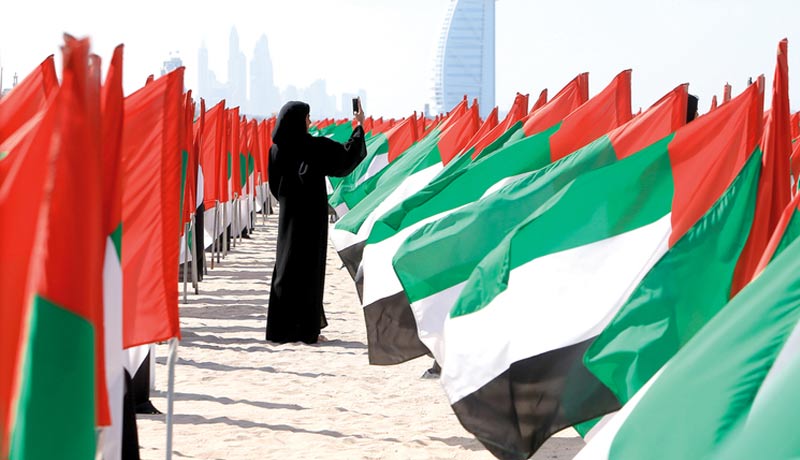UNITED-ARAB-EMIRATES/ Women in the UAE are notably tranquil; when discussions on gender parity getting worse; are heating up around the world.
Women hold a multiplicity of roles in the UAE’s private sector; best exemplified by Strata, the advanced aerospace manufacturing firm in Al Ain; where 88 percent of the Emirati workforce is female. Women-owned businesses account for 10 percent of the private sector and prominence is stronger in the public sector. With nine federal ministers, the participation of women in the UAE Cabinet is amongst the highest in the world; and women make up half the consultative parliamentary body, Federal National Council (FNC).
Women here are free, safe, educated, and equal to men – and this is noticed, cited, and lauded widely. The UAE was ranked the Middle East’s leader in the World Economic Forum’s Global Gender Gap 2022 report. In 2021, a Georgetown University study placed the UAE’s safety for women at 98.5 per cent; the highest in the world. In
Champions of Climate Action
Earlier this month, the Emariti Ministry of Foreign Affairs, International Cooperation of the UN Women Liaison Office plus the General Women’s Union (GWU); jointly launched the Climate Change and Gender Equality initiative as part of the UAE’s preparations for the 28th Conference of the Parties (COP28).
HH Sheikha Fatima Bint Mubarak, Chairwoman of the GWU; emphasized the importance of women as active and influential partners in climate change. “The UAE is keen to involve women to contribute effectively to national efforts to enhance environmental preservation and reach sustainable solutions. This is a confirmation and continuation of the UAE’s pioneering model in women’s rights and our belief in their creative abilities; and inspiring energies in all sectors and fields.”
The initiative aims to build on the connection between gender balance and climate change.
Positions of Executive Leadership
Gender equality in the workplace is now an important factor in the assessment of companies. Increased attention on the ‘S’ component of ESG (Environmental, Social; Governance) is joined by an emerging focus on higher levels of DEI (Diversity, Equity, Inclusion). Both routes advocate workplaces that are free of bias, stereotypes; and discrimination, and higher women’s representation in executive leadership, and board-level positions.
Eugene Mayne, CEO of Tristar Group; and Board Member of the UAE network of United Nations Global Compact (UNGC) explain this. “The variety and volume of changes impacting the work environment is staggering; technological advances, demographic shifts, the gig economy, and the digital era, to name a few,” he says.
“These trends are disrupting traditional work models, the nature of jobs, and the composition of workforces. As organizations prepare for a digital future; scaling up both ESG plus DEI solutions is not just essential, it is vital.”
Winners of the Digital Era
Mayne is scheduled to participate in an upcoming roundtable at the UN Headquarters in New York; themed ‘A Gender Equal Future of Work in the Digital Age’; and his focus is what companies can do and what they will gain. “It should be less about the token representation of women, and more about their fuller participation and career fulfillment.”
The World Economic Forum estimates that only 22 percent of AI (artificial intelligence) professionals are female today.

Tech-based businesses offer women more flexibility and autonomy, allowing them to manage caregiving responsibilities alongside paid work.
Wearers of “Many Hats”
Dr. Imneet Madan, Specialist Pediatric Dentist at Dr. Michael’s Dental Clinic earned three master’s degrees in her quest ‘to establish a success; focused practice with the least number of flaws’. After completing the first in dental science and endodontics, and the second in laser dentistry; she topped it up with the third in business management.
As a successful medical professional and businesswoman, Dr. Madan says achievement comes to those who stick to the course. “Keep your goals crystal clear; and no matter how many hurdles pull you down you will make progress; as long as you are on track and stay loyal to your dream.”
Her opinion is mirrored by Katerina Pawlowski Hanafin, COO and Co-Founder, of Huriya Private, who says social conditioning can be a restriction. “Some women are scared to seek higher paid jobs in male-dominated industries or assume that certain jobs are better handled by men” she urges.
Hanafin illustrates this: “In 2022, the percentage of women applying for a second citizenship was 24 percent; and this catapulted to 38 percent in January and February 2023,” she observes.
Source: Gulf News


